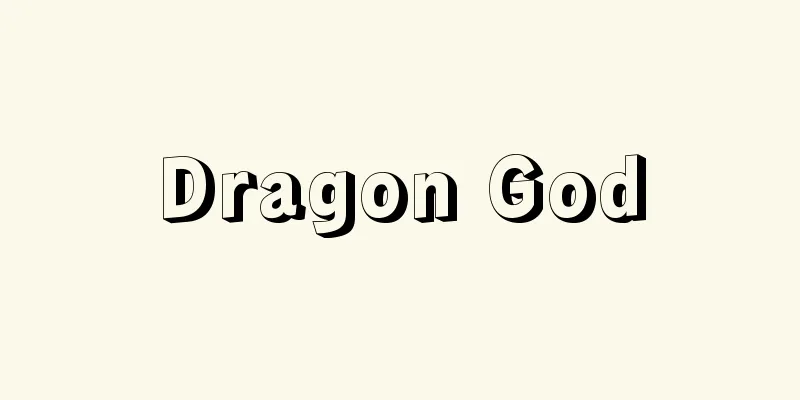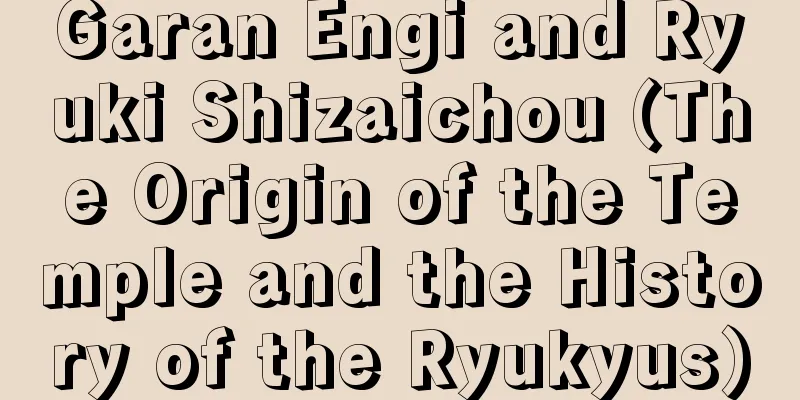Dragon God

|
He is also called the Dragon King, or simply Dragon. Dragons are originally imaginary animals, but they have been deified and worshipped. They are said to live in water or underground, and sometimes fly through the air, shooting lightning and bringing rain. Japan's belief in the dragon god can be said to have been formed by syncretizing the ancient belief in the water god with the belief in the dragon that was introduced from China. For example, in rain-making rituals, there is a custom of throwing waste and the hearts of horses and cows into deep pools and ponds. It is said that this angers the dragon god who lives in the pools, causing rain. Deep pools and ponds originally had water gods, which were thought to take the form of giant snakes. These water gods have since transformed into dragon gods. It is said that the dragon gods rise to the sky during tornadoes. This is likely a combination of the dragon god and the belief in the thunder god. On the other hand, the belief in the dragon god is also closely related to the belief in the sea god. Fishermen have a custom of mooring their boats offshore on the day of the festival, called the Dragon God Festival or the Dragon Palace Festival. It is said to be an apology for causing trouble in the sea. The dragon god hates metal objects, so fishermen are strictly warned not to drop blades into the sea. This shows that the snake belief, which hates iron, is at the root of this. In the myth, Toyotamahime was the daughter of the sea god, and when she married Yamasachihiko and gave birth to a child, she revealed her true nature as a giant crocodile. In the Nihon Shoki, she is described as taking the form of a dragon. This is probably due to contact with the belief in the dragon god. In legends and old tales, the dragon god is seen as someone who gives wealth to humans. In the legend of the "Ryugu-fuchi" (Ryugu Pool), the pool leads to the Dragon Palace, and if you ask to borrow a meal or bowl there, the dragon god will prepare it for you the next day. In the old tales "Ryugu Doji" and "Ryugu Nyobo", those who please the dragon god will gain wealth and live happily. "Golden Axe" is one such story. The dragon god's palace is a land of rich treasures. [Junichi Nomura] [Reference] |Source: Shogakukan Encyclopedia Nipponica About Encyclopedia Nipponica Information | Legend |
|
竜王とも、あるいは単に竜ともいう。竜はもともと想像上の動物であるが、神格化されて信仰されてきた。水中や地中に住み、ときには空中を飛んで稲妻を放ち、雨を降らせるという。わが国の竜神信仰は、古来からの水神信仰に中国から伝わった竜信仰が習合して構成されたといえる。たとえば雨乞(ご)いの儀礼をみると、淵(ふち)や池沼に汚物や牛馬の心臓などを投げ入れるという風習がある。これは淵に住む竜神を怒らせて雨を降らせるのだと伝えている。淵や池沼にはもともと水神がいて、それは大蛇の姿をとるものと考えられてきた。それが竜神に変化している。竜巻のときに竜神が天に昇ると伝えられている。これは竜神が雷神信仰と結び付いたものであろう。 一方、竜神信仰は海神信仰とも関連が深い。漁民の間では竜神祭あるいは竜宮祭と称して、その日は沖止めをするという習わしがある。海を荒らしたおわびだという。竜神は金物が嫌いだから、海に刃物などを落とすのを漁業関係者は厳しく戒めている。これなどは、鉄を嫌う蛇信仰がその根底にあるのを教えてくれる。神話の豊玉姫(とよたまひめ)は海神の娘で、山幸彦(やまさちひこ)と結ばれ御子(みこ)を産むときに、大鰐(おおわに)の本性を現した。『日本書紀』ではそれを竜の姿と伝えている。竜神信仰との接触によるものであろう。伝説や昔話では、竜神は人間に富を与える存在としてある。「竜宮淵」の伝説では、その淵が竜宮に通じており、そこに膳(ぜん)や椀(わん)を貸してくれるように願うと、翌日には竜神が用意してくれるという。また昔話の「竜宮童子」「竜宮女房」なども、竜神の意にかなった者が富を得て幸福に暮らすという内容である。「黄金の斧(おの)」もそうした系統の話である。竜神のいる竜宮は豊かな宝の国である。 [野村純一] [参照項目] |出典 小学館 日本大百科全書(ニッポニカ)日本大百科全書(ニッポニカ)について 情報 | 凡例 |
Recommend
Mie - 30
〘 noun 〙 [1] The state of three things or matters ...
Marktfahren
…Until the end of the 12th century, 90% of charte...
Mitsushima [town] - Mitsushima
An old town in central Tsushima, Shimoagata County...
Rummindei
...The ruins were excavated by A. Fuller in 1896,...
Cumulant generating function
…The same is true for the characteristic function...
Yinsai (Hu) - Yinsai
… Enzai (water jar vegetable) is also called Yosa...
Korsun' (English spelling)
…It was occupied by German troops in 1941 during ...
Homogeneous catalytic reaction
…The reaction rate is significantly increased com...
Coastal zone (lakes and marshes)
… [Lake creatures] Because lakes and ponds are se...
Rauschenbusch, Walter
Born October 4, 1861 in Rochester Died: July 25, 1...
Shitoku (English spelling)
The four great rivers of China. The term "Hua...
Daini Sanmi - Daini Sanmi
Date of birth and death unknown. A female poet of...
Zulu Kingdom
A kingdom that flourished on the east coast of Sou...
Golden Weigher
…He, who had been merely a scholar of little fame...
Gonpachi Komurasakimono
It is a branch of Kabuki and Kyogen. Hirai Gonpach...









